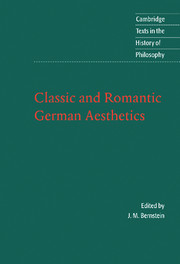Book contents
- Frontmatter
- Contents
- Introduction
- Chronology
- Further reading
- Note on the texts
- Aesthetica in nuce: A Rhapsody in Cabbalistic Prose (1762)
- Laocoön: An Essay on the Limits of Painting and Poetry (1766)
- From ‘On the Artistic Imitation of the Beautiful’ (1788)
- ‘Kallias or Concerning Beauty : Letters to Gottfried Körner’ (1793)
- ‘Oldest Programme for a System of German Idealism’ (1796)
- ‘Letter to Hegel, 26 January 1795’
- ‘Being Judgement Possibility’ (1795)
- ‘The Significance of Tragedy’ (1802)
- ‘Remarks on Oedipus’ (1803)
- From Miscellaneous Remarks (1797)
- ‘Monologue’
- ‘Dialogues’ (1798)
- ‘On Goethe’ (1798)
- ‘Studies in the Visual Arts’ (1799)
- From ‘Critical Fragments’ (1797)
- From ‘Athenaeum Fragments’ (1798)
- From ‘Ideas’ (1800)
- ‘On Goethe's Meister’ (1798)
- ‘Letter About the Novel’ (1799)
- ‘On Incomprehensibility’ (1800)
- Index
- Cambridge texts in the history of philosophy
‘Dialogues’ (1798)
Published online by Cambridge University Press: 05 June 2012
- Frontmatter
- Contents
- Introduction
- Chronology
- Further reading
- Note on the texts
- Aesthetica in nuce: A Rhapsody in Cabbalistic Prose (1762)
- Laocoön: An Essay on the Limits of Painting and Poetry (1766)
- From ‘On the Artistic Imitation of the Beautiful’ (1788)
- ‘Kallias or Concerning Beauty : Letters to Gottfried Körner’ (1793)
- ‘Oldest Programme for a System of German Idealism’ (1796)
- ‘Letter to Hegel, 26 January 1795’
- ‘Being Judgement Possibility’ (1795)
- ‘The Significance of Tragedy’ (1802)
- ‘Remarks on Oedipus’ (1803)
- From Miscellaneous Remarks (1797)
- ‘Monologue’
- ‘Dialogues’ (1798)
- ‘On Goethe’ (1798)
- ‘Studies in the Visual Arts’ (1799)
- From ‘Critical Fragments’ (1797)
- From ‘Athenaeum Fragments’ (1798)
- From ‘Ideas’ (1800)
- ‘On Goethe's Meister’ (1798)
- ‘Letter About the Novel’ (1799)
- ‘On Incomprehensibility’ (1800)
- Index
- Cambridge texts in the history of philosophy
Summary
A. The new catalogue for the book fair?
B. Still wet from the printer's.
A. What a load of letters – what a monstrous waste of time!
B. You seem to belong to the Omarists – if I may call you after the most thorough-going of your kind.
A. You don't intend to sing the praises of this book-making epidemic, do you?
B. Why praises? But I am certainly delighted at how the number of these articles of trade increases year by year. Their export brings only reputation, but their import brings solid profit. There are more honest and worthy ideas circulating among us than among all our neighbours put together. The middle of the present century saw the discovery of these great mines in Germany, richer than those of Potosi or Brazil, which will surely bring about a greater revolution, now and in the future, than the discovery of America. What advances we have since made in the scientific extraction, treatment, and brilliant and useful processing of their products! Every where we are bringing together the crude ore or the beautiful moulds – we are melting down the ore, and have the skills to imitate and surpass the moulds. And you want me to fill all those mines in? And return to the rude poverty of our forefathers? Are they not at least a spur to activity? And is not any activity worthy of praise?
A. Put like that, there is nothing to object to. But let us take a closer look at the fine art and the precious metal.
B. I shall not admit arguments against the whole enterprise which are based on the frailty and inadequacy of the individual. This kind of thing needs to be seen as a whole.
- Type
- Chapter
- Information
- Classic and Romantic German Aesthetics , pp. 216 - 226Publisher: Cambridge University PressPrint publication year: 2002

